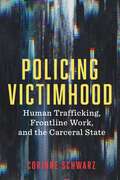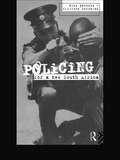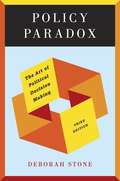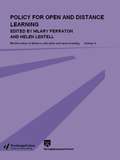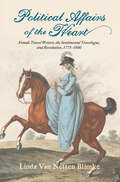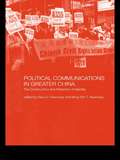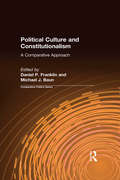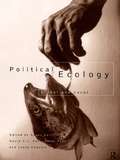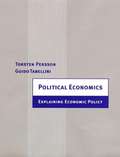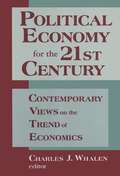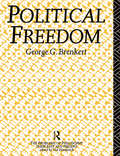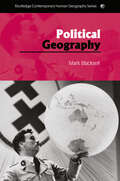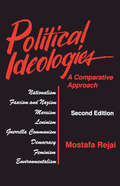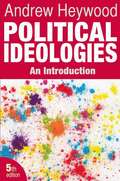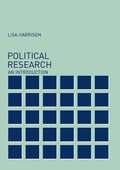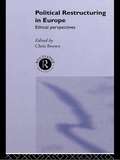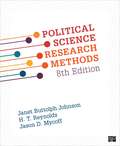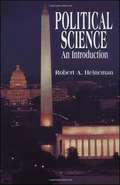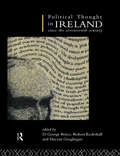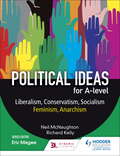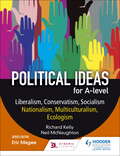- Table View
- List View
Polar Opposites (Super Villain Academy #2)
by Kai StrandThe supers are balanced. Academies have altered their curriculum to teach both sides of the super power spectrum. All's well in the super world. Right? When Mystic kidnaps Oceanus, Jeff learns it isn't all right. Turning to the newly balanced supers for assistance, he panics to find they've done nothing to rescue Oceanus. When no ransom request follows, he worries Mystic's plan never included returning his girlfriend. Frustrated, he's forced to work with the only super willing to help. Oceanus' ex-villain, ex-boyfriend, Set. Mystic isn't the only one hiding something. Nothing about Jeff is balanced. Temper flares result in scorched clothing or flying furniture, and his charm has become an indiscriminating people-magnet. Jeff is convinced, or maybe just hopeful, that his lack of control is directly related to Oceanus being gone. But will he and Set find her before Jeff loses control completely and will they find her alive?
Police Field Operations: Theory Meets Practice
by Cliff Roberson Michael L. BirzerPolice Field Operations: Theory Meets Practice, 2/e is a comprehensive, readable text that presents a practical look at police field operations and is designed to be used in one-semester courses on police operations or patrol procedures. Chapters have been designed to be independent units that can be taught individually, but also build upon each other to provide a complete picture of police operations. The text cover all major areas of police operations including patrolling, investigations, crime mapping, community policing, hot pursuit issues, communications, gangs and drugs, and more. Discussions focus on issues and challenges that police officers face on the job and help students bridge the gap between theory and practice.
Policing Democracy: Overcoming Obstacles to Citizen Security in Latin America
by Mark Ungar2011 Winner of the Charles H. Levine Memorial Book Prize of the International Political Science AssociationLatin America’s crime rates are astonishing by any standard—the region’s homicide rate is the world’s highest. This crisis continually traps governments between the need for comprehensive reform and the public demand for immediate action, usually meaning iron-fisted police tactics harking back to the repressive pre-1980s dictatorships. In Policing Democracy, Mark Ungar situates Latin America at a crossroads between its longstanding form of reactive policing and a problem-oriented approach based on prevention and citizen participation. Drawing on extensive case studies from Argentina, Bolivia, and Honduras, he reviews the full spectrum of areas needing reform: criminal law, policing, investigation, trial practices, and incarceration. Finally, Policing Democracy probes democratic politics, power relations, and regional disparities of security and reform to establish a framework for understanding the crisis and moving beyond it.
Policing Victimhood: Human Trafficking, Frontline Work, and the Carceral State (Critical Issues in Crime and Society)
by Corinne SchwarzSince the turn of the twentieth century, human trafficking has animated public discourses, policy debates, and moral panics in the United States. Though some nuances of these conversations have shifted, the role of the criminal legal system (police officers, investigators, lawyers, and connected service providers) in anti-trafficking interventions has remained firmly in place. Policing Victimhood explores how frontline workers in direct contact with vulnerable, exploited, and trafficked persons—however those groups are defined at personal, organizational, or legal levels—defer to the tools of the carceral state and ideologies of punishment when navigating their clients’ needs. In Policing Victimhood, Corinne Schwarz interviewed with service providers in the Midwestern US, a region that, though colloquially understood as “flyover country,” regularly positions itself as a leader in state-level anti-trafficking policies and collaborative networks. These frontline workers’ perceptions and narratives are informed by their interpersonal, day-to-day encounters with exploited or trafficked persons. Their insights underscore how anti-trafficking policies are put into practice and influenced by specific ideologies and stereotypes. Extending the reach of street-level bureaucracy theory to anti-trafficking initiatives, Schwarz demonstrates how frontline workers are uniquely positioned to perpetuate or radically counter punitive anti-trafficking efforts. Taking a cue from anti-carceral feminist critiques and critical trafficking studies, Schwarz argues that ongoing anti-trafficking efforts in the US expand the punitive arm of the state without addressing the role of systemic oppression in perpetuating violence. The violence inherent to the carceral state—and required for its continued expansion—is the same violence that perpetuates the exploitation of human trafficking. In order to solve the “problem” of human trafficking, advocates, activists, and scholars must divest from systems that center punishment and radically reinvest their efforts in dismantling the structural violence that perpetuates social exclusion and vulnerability, what she calls the “-isms” and “-phobias” that harm some at the expense of others’ empowerment. Policing Victimhood encourages readers to imagine a world without carceral violence in any of its forms.
Policing for a New South Africa
by Mike Brogden Clifford D. ShearingFirst published in 1993. Routledge is an imprint of Taylor & Francis, an informa company.
Policy Paradox: The Art of Political Decision Making (Third Edition)
by Deborah StoneThe most accessible policy text available. Policy making is a political struggle over values and ideas. By exposing the paradoxes that underlie even seemingly straightforward policy decisions, Policy Paradox shows students that politics cannot be cleansed from the process in favor of "rationality. " Author Deborah Stone has fully revised and updated this popular text, which now includes many paradoxes that have arisen since September 11. Examples throughout the book have been updated, and the prose has been streamlined to make a great read even better.
Policy for Open and Distance Learning: World review of distance education and open learning Volume 4
by Hilary Perraton Helen LentellPolicy for Open and Distance Learning considers the questions that planners and policy makers in open and distance learning need to address at any level of education.Starting by analysing the range of purposes for which open and distance learning is used, the book places the issues in context and examines experience in both the public and private sector. As well as discussing in detail new agenda set by new information and communication technologies, the book covers:* Inputs * Processes * Outcomes.The editors, Hilary Perraton and Helen Lentell, have drawn together an international team of contributors who have examined the varied roles of the new technologies as well as low-technology approaches to open and distance learning throughout the world.This book will be invaluable to policy makers in education and those planning or managing open and distance learning programmes. It will also be of interest to students and teachers of education and anyone concerned with comparative education.
Polish Jewish Culture Beyond the Capital: Centering the Periphery
by Zehavit Stern Ela Bauer Naomi Seidman Daniel Kupfert Heller Marcos Silber Justin Cammy Eugenia Prokop-Janiec Bozena Shallcross Malgorzata Stolarska-Fronia Magdalena Kozlowska Sylwia Jakubczyk-Sleczka Alicja Maslak-MaciejewskaPolish Jewish Culture beyond the Capital: Centering the Periphery is a path-breaking exploration of the diversity and vitality of urban Jewish identity and culture in Polish lands from the second half of the nineteenth century to the outbreak of the Second World War (1899–1939). In this multidisciplinary essay collection, a cohort of international scholars provides an integrated history of the arts and humanities in Poland by illuminating the complex roles Jews in urban centers other than Warsaw played in the creation of Polish and Polish Jewish culture. Each essay presents readers with the extraordinary production and consumption of culture by Polish Jews in literature, film, cabaret, theater, the visual arts, architecture, and music. They show how this process was defined by a reciprocal cultural exchange that flourished between cities at the periphery—from Lwów and Wilno to Kraków and Łódź—and international centers like Warsaw, thereby illuminating the place of Polish Jews within urban European cultures. Companion website (https://polishjewishmusic.iu.edu)
Political Affairs of the Heart: Female Travel Writers, the Sentimental Travelogue, and Revolution, 1775-1800 (Transits: Literature, Thought & Culture 1650-1850)
by Linda Van BlimkeRichly researched and engagingly written, Political Affairs of the Heart traces the emergence of female sentimental travel writing in late eighteenth-century Britain, and posits its centrality to women’s engagement with national and gender politics. This study examines four travel narratives written by women between 1774 and 1795, convincingly arguing that they effectively deploy the discourse of sensibility to engage with debates around Britain’s national identity during the French and American Revolutions. Van Netten Blimke contends that Laurence Sterne’s A Sentimental Journey (1768)—which first introduced sentimental discourse to the travelogue—facilitated women’s gradual inclusion into this previously male-dominated genre, effectively paving the way for women to influence the country’s sociopolitical transformation. These four previously understudied works successfully combine eyewitness authority with the language of sensibility to mount impassioned interventions in their nation’s perception and practice of revolutionary politics, at a time when its national identity was most in flux.
Political Communications in Greater China: The Construction and Reflection of Identity
by Gary D. Rawnsley Ming-Yeh T. RawnsleyThis book examines the role played by political communications, including media of all kinds - journalism, television, and film - in defining and shaping identity in Greater China; China, Hong Kong, Taiwan and overseas Chinese. In the context of increasing cross-border interactions of people, investment and commercial products between the component parts of greater China, the book explores the idea that identity, rather than nation-states or political entities, may be the key factor in achieving further integration in Greater China. The book focuses on the ways in which identity is communicated, and shows how communication of identity within and between the component parts of greater China plays a central role in bringing about integration.
Political Culture and Constitutionalism: A Comparative Approach (Comparative Politics Ser.)
by Daniel P. Franklin Michael J. BaunThis work is a cross-national examination of the relationship between political culture and constitutionalism. The countries studied include Nigeria, Turkey and Japan. Questions explored include whether constitutions must evolve and whether constitutionalism is only a western concept.
Political Ecology: Global and Local (Routledge Studies in Governance and Change in the Global Era)
by Peter Penz Roger Keil David V.J. Bell Leesa FawcettPolitical Ecology addresses environmental issues which Innis was concerned with, from a contemporary, political economy perspective. They explore a wide range of themes and issues including: * sustainability * risk and regulation * population growth * planetary management * impact of humanity on environment * role of technology and communication. Case studies provide further insight into issues such as industrial racism, women and development and collective action by highlighting ethical and political questions and providing critical insights into the issues and debates in political ecology.
Political Economics: Explaining Economic Policy
by Torsten Persson Guido Enrico TabelliniWhat determines the size and form of redistributive programs, the extent and type of public goods provision, the burden of taxation across alternative tax bases, the size of government deficits, and the stance of monetary policy during the course of business and electoral cycles? A large and rapidly growing literature in political economics attempts to answer these questions. But so far there is little consensus on the answers and disagreement on the appropriate mode of analysis. Combining the best of three separate traditions--the theory of macroeconomic policy, public choice, and rational choice in political science--Torsten Persson and Guido Tabellini suggest a unified approach to the field. As in modern macroeconomics, individual citizens behave rationally, their preferences over economic outcomes inducing preferences over policy. As in public choice, the delegation of policy decisions to elected representatives may give rise to agency problems between voters and politicians. And, as in rational choice, political institutions shape the procedures for setting policy and electing politicians. The authors outline a common method of analysis, establish several new results, and identify the main outstanding problems.
Political Economy for the 21st Century: Contemporary Views on the Trend of Economics
by Charles J. Whalen Hyman P. MinskyThis text provides an alternative to conventional economics, drawing on the neoclassical and non-neoclassical insights of Lester Thurow, Robert Heilbroner, Alice Amsden, Barry Bluestone and 11 other prominent economists from America and England. It is intended to provide productive analyses of several contemporary economic problems.
Political Freedom (Problems of Philosophy #49)
by George G. BrenkertThis book examines the underlying theoretical issues concerning the nature of political freedom. Arguing that most previous discussions of such freedom have been too narrowly focused, it explores both conservativism from Edmund Burke to its present resurgence, the radical tradition of Karl Marx, as well as the orthodox liberal model of freedom of John Locke, John Stuart Mill and Isaiah Berlin. Political Freedom argues that these three accounts of political freedom - conservative, liberal and radical - all have internal weaknesses which render them unsatisfactory.In the second part of the book George Brenkert develops an alternative theory of political freedom. Using the guiding concept of empowerment, his model explores individual rights, democratic participation in government and workplace, and the need to provide the material and educational resources to allow individuals to effectively exercise their rights to self-determination. It is a clear and bold attack on the view that there is no link between freedom and power.
Political Geography (Routledge Contemporary Human Geography Series)
by Mark BlacksellIn 1904 Sir Halford Mackinder published his seminal paper The Geographical Pivot of History demonstrating the central position of political geography in the study of geography as a whole; a century later and political geography is still at the heart of human geography. Yet over time political geography has experienced many significant ups and downs, eventually recovering to a position of renewed pre-eminence as the last century drew to a close. This fascinating journey, charted by this equally fascinating book, forms a key part of the history of the evolution of spatial science. Beyond a narrative, the book provides an introduction to all the complex elements that constitute political geography today. Organized in three distinct sections, it covers: process and patterns ideology and geopolitical visions beyond the state. Tackling key contemporary issues (such as politics and the local state), as well as more traditional topics (such as state formation and international relations), this thought-provoking book covers the range of theoretical approaches. Including many original maps and diagrams which skilfully illustrate key themes, this book is a concise, student-friendly, pedagogically rich introduction for students of geography, political science and world affairs.
Political Ideologies: A Comparative Approach
by Mostafa RejaiDesigned for classroom use, this book develops a framework for the comparative analysis of political ideologies and examines the most prominent political ideologies of modern time. This revised edition has been enlarged to include feminism and environmentalism.
Political Ideologies: An Introduction (Fifth Edition)
by Andrew HeywoodA clear and accessible introduction to the political creeds and doctrines that have dominated and shaped world politics. The fifth edition has been thoroughly updated throughout and now has more on the influence of globalization on ideology and a new-look page design to aid student learning.
Political Research: An Introduction
by Lisa Harrison Nicholas StartinPolitical Research: An Introduction has been designed to provide an excellent starting point for those new to the area of Research Methods. It assumes no prior knowledge of the subject and sets out the key issues involved in doing research in Politics. It guides students through a complex and often daunting subject by exploring the many concepts associated with the field, as well as offering practical advice on research practices and information resources. Features and benefits of this textbook include:* boxed case studies in each chapter to illustrate and clarify key concepts, and highlight the practical use of different research methods* a useful glossary, giving easy access to definitions of key terms* a dedicated web-site containing sample material, extra case studies, important links, and essential resources for both teachers and students.
Political Restructuring in Europe: Ethical Perspectives
by Chris BrownA distinguished selection of contributors provide the theoretical background to the restructuring of Europe that is currently underway. It attempts to situate the ethical debates in a historical, legal and constitutional context, considering important and topical issues such as the rights to seccession and self-determination of minorities in Eastern Europe, and the question of whether national movements are justified in using force to achieve their ends.The authors number legal and constitutional scholars, political philosophers and international relations theorists. There are contributions from Poland and Croatia.
Political Science Research Methods
by Janet Buttolph Johnson Jason D. MycoffThe Eighth Edition of this trusted resource offers a greater emphasis on the ways in which particular methods are used by undergraduates, expanded coverage of the role of the Internet in research and analysis, and more international examples.
Political Science: An Introduction
by Robert A. HeinemanIntroductory college textbook on political science
Political Thought in Ireland Since the Seventeenth Century
by Robert Eccleshall Vincent Geoghegan D. George BoyceThese pioneering essays provide a unique study of the development of political ideas in Ireland from the seventeenth to the twentieth century. The book breaks away from the traditional emphasis in Irish historiography on the nationalism/unionism debate to focus instead on previously neglected areas such as the role of the Scottish Enlightenment and early Irish socialism and conservatism. A wide range of original primary sources are used from pamphlets to journalism, devotional tracts to poetry.
Political ideas for A Level: Liberalism, Conservatism, Socialism, Feminism, Anarchism
by Neil Mcnaughton Richard KellyExam Board: AQA, Edexcel, OCR & WJECLevel: A-levelSubject: PoliticsFirst Teaching: September 2017First Exam: June 2018Build your students' knowledge of the ideas, tensions and key thinkers within the core ideologies of conservatism, liberalism and socialism, plus the additional ideologies of feminism and anarchism.Students will understand the core ideas and principles behind the political ideologies, and how they apply in practice to human nature, the state, society and the economy.- Comprehensive coverage of the ideologies of Liberalism, Conservatism, Socialism, Feminism and Anarchism- Definitions of key terms and concepts to help clarify knowledge and understanding of political language- Exam focus sections at the end of each chapter to test and develop understanding of key topics, offering practice for short and essay questions.
Political ideas for A Level: Liberalism, Conservatism, Socialism, Nationalism, Multiculturalism, Ecologism
by Neil Mcnaughton Richard KellyExam Board: AQA, Edexcel, OCR & WJECLevel: A-levelSubject: PoliticsFirst Teaching: September 2017First Exam: June 2018Build your students' knowledge of the ideas, tensions and key thinkers within the core ideologies of conservatism, liberalism and socialism, plus the additional ideologies of Nationalism, Multiculturalism and Ecologism.Students will understand the core ideas and principles behind the political ideologies, and how they apply in practice to human nature, the state, society and the economy.- Comprehensive coverage of the ideologies of Liberalism, Conservatism, Socialism, Nationalism, Multiculturalism and Ecologism- Definitions of key terms and concepts to help clarify knowledge and understanding of political language- Exam focus sections at the end of each chapter to test and develop understanding of key topics, offering practice for short and essay questions



